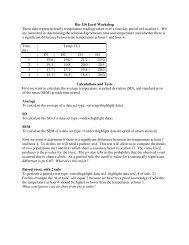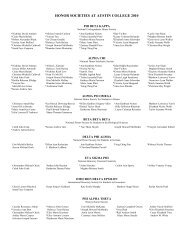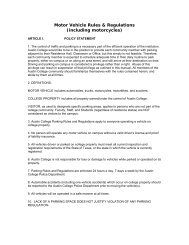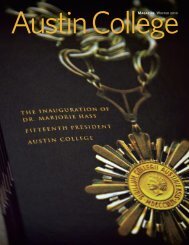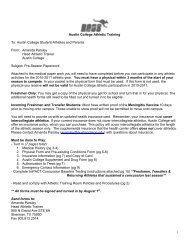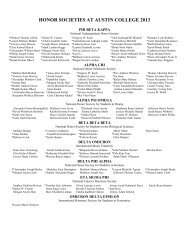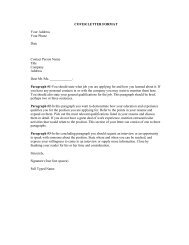Create successful ePaper yourself
Turn your PDF publications into a flip-book with our unique Google optimized e-Paper software.
ECONOMICS AND BUSINESS ADMINISTRATIONconsequences of these policies for economicstability and growth. Attention is given to currentpolicy issues and to the history and developmentof economic thought. Prerequisite:Economics 111 and Mathematics 151. (Each fall)341 Urban and Regional EconomicsExplores the socioeconomic aspects and policyimplications of congestion, population characteristicsand measurement, geography, regionaldifferences, urban and rural unemploymentissues, and utilities. Prerequisite: Economics111. (Offered on an occasional basis)350 Advanced Topics inEconomics and Business(Variable course credit)Specialized topics offered on an occasionalbasis. May be repeated when topic varies.361 Finance(see Business Administration 361)368 International Business(See Business Administration 368)371 EconometricsThis course introduces students to the techniquesnecessary to perform empirical economicresearch. Topics to be covered includemultivariate regression, model diagnostics, andthe interpretation of regression results. Studentswill learn how to use SAS to perform data analysis.Prerequisite: Economics 301, Mathematics120 or Social Science 120, and Mathematics151. (Each Fall)401 Advanced MicroeconomicsThe purpose of this class is to provide studentsplanning to attend graduate school a deeperexamination of microeconomic theory. Topicscovered include theory of consumer choiceand production theory in a competitive environment.Presentation of the material reliesheavily on mathematics. Prerequisite: ECO 301and ECO 302. (Every other Spring)450 Advanced Topics inEconomics and BusinessSpecialized topics offered on an occasionalbasis. May be repeated when topic varies.458 Monetary Institutions and PolicyThis course is an examination of the monetaryand central banking system and its relation tothe operation of the economy. The nature andfunctions of money, the functions and instrumentsof the Federal Reserve System, strategiesand effectiveness of central banking, and thedeterminants of interest rates and the moneysupply are all examined. Special attention isgiven to both theoretical models of money demandand supply. Prerequisite: Economics 302.(Every other fall)460 Advanced Directed Study(Variable course credit)464 Teaching/Learning ParticipationAn individualized study that includes sharingin the instructional process for a particulareconomics course under the supervision of thefaculty member teaching the course. Open onlyto certain highly qualified juniors and seniorsby invitation. (Additional details given in thesection on Other Learning Opportunities.)471 International FinanceThis course considers international monetaryenvironments, theory of international capitalmovement and banking, foreign exchangemarkets, foreign exchange exposure, currencyswaps, interest rate risk, international monetarypolicy cooperation, and international bankingstructure and regulation. Attention will also begiven to monetary policy and the relation ofmoney to inflation, interest rates, and businesscycles. Prerequisite: Economics 301 and BusinessAdministration 361. (Each spring)472 Law and EconomicsExamines the interaction of economics, law,and politics in the creation of the modern state.Uses classical and modern economic and politicaltheory to determine the appropriate economicrole for government, with particular attention toindustrial organization, anti-trust and regulatedpolicies; emphasizes the influence of economicson legal reasoning and applies economicanalysis to tort, contract, property, and criminallaw. Prerequisite: Economics 301. (Offered onan occasional basis)473 Public FinanceExplores how the taxation and expenditurepolicies of the government affect the welfareof citizens, with an emphasis on the UnitedStates federal government. Examines themotivations behind government participationin the economy (public goods, externalities,efficiency, and equity), explores how thegovernment makes decisions on where it willallocate its available resources, and considersboth theoretical and empirical issues relatedto the design and impact of government taxationpolicies. The economic impact of theCOURSES OF INSTRUCTION| 103




